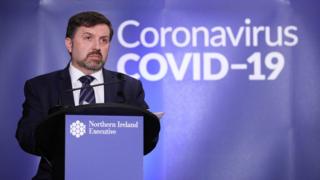 Image copyright
PA Media
Image copyright
PA Media
A new action plan to improve mental health services in Northern Ireland includes a "dedicated Covid-19 response" the health minister has said.
The plan published by Robin Swann lists 38 actions to help mental health patients access the support they need.
Mr Swann said the "devastating impact of Covid-19" had brought the need for mental health support into sharp focus.
The plan also includes specialist perinatal mental health services for pregnant women and new mothers.
"Since taking up post, I have been very clear that mental health is a priority for me," Mr Swann said in a statement.
"The Mental Health Action Plan is the first in a series of steps I will take to ensure those suffering from mental ill health will be able to access the services they need, when they need them."
The minister added: "The importance of this has been brought into sharp focus during these unprecedented times, when the mental health of the population is suffering as a result of the devastating impact of Covid-19.
"That is why the Action Plan includes a dedicated Covid-19 response plan which outlines the psychological wellbeing and mental health response to the current pandemic."
In addition to the coronavirus response and specialist perinatal services, the 38-point plan includes:
- a review of mental health crisis services
- a review of suicide and homicide
- further support for mental health services in GP surgeries
- the development of "managed care networks" for child and adolescent mental health services
Mr Swann has also made a commitment to publishing a new 10-year mental health strategy by the end of this year.
But in the interim, he said this action plan "will provide a common focus and direction for the development of mental health services, while also delivering key improvements to services needed right now".
A plan to have a plan?
The plan was welcomed by the charity Action Mental Health, whose chief executive David Babington described it as "great news" and a "really positive thing".
He told the BBC's Good Morning Ulster programme it was something the sector had been lobbying for over many years.
"If this is fully funded and we have accountability to make sure people work together to get this done, we really are in different place from the perspective of mental health in Northern Ireland," Mr Babington said.
Asked if it was a really only a "plan to have a plan" in the absence of a full mental health strategy, Mr Babington acknowledged the document was a "short-term measure for the here and now".
But he said it would help deal with immediate challenges posed by the Covid-19 outbreak as it is feared patients with existing mental health issues "are going to have worse problems as we emerge from the lockdown".
Mr Babington said there was also "anecdotal evidence" that the pandemic was causing more anxiety and stress in the wider population because of rising unemployment, self-isolation and fear of a recession.
Before the Covid-19 outbreak reached Northern Ireland, many patients, charities and stakeholders had warned of an existing crisis in local mental health services.
Last year, it was reported that one in 10 school children in Northern Ireland have a diagnosable mental illness, after figures showed 35,000 children were treated by Child and Adolescent Mental Health Services (Camhs) in 2018.
In September 2018, Northern Ireland's Commissioner for Children and Young People (Niccy) produced a report on children and young people's mental health services, entitled Still Waiting, which made several recommendations to improve services.
In early February this year, the commissioner Koulla Yiasouma said progress in implementing the 2018 recommendations had been "too slow".
She warned Stormont ministers they must act urgently to "divert the current mental health epidemic among young people".
The Department of Health said Mr Swann's 38-point plan "creates clear linkages with other mental health improvement work, including the inter-departmental action plan in response to Niccy's Still Waiting report".